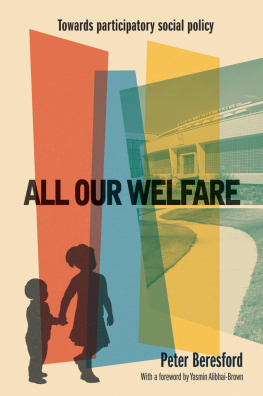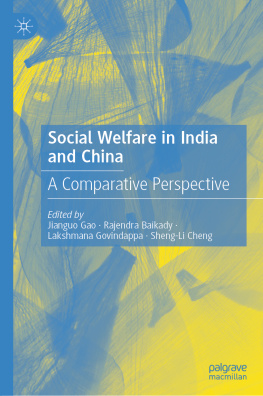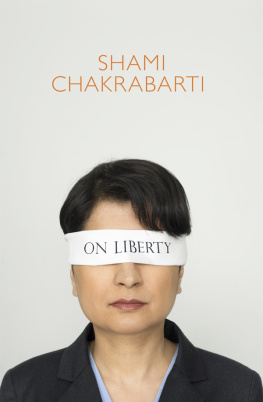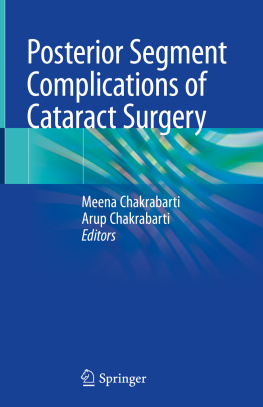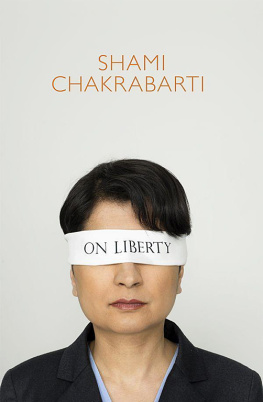SOCIAL WELFARE
Social Welfare
Scottish perspective
Edited by
MONO CHAKRABARTI
University of Strathclyde
First published 2001 by Ashgate Publishing
Reissued 2018 by Routledge
2 Park Square, Milton Park, Abingdon, Oxon OX14 4RN
711 Third Avenue, New York, NY 10017, USA
Routledge is an imprint of the Taylor & Francis Group, an informa business
Copyright Mono Chakrabarti 2001
All rights reserved. No part of this book may be reprinted or reproduced or utilised in any form or by any electronic, mechanical, or other means, now known or hereafter invented, including photocopying and recording, or in any information storage or retrieval system, without permission in writing from the publishers.
Notice:
Product or corporate names may be trademarks or registered trademarks, and are used only for identification and explanation without intent to infringe.
Publishers Note
The publisher has gone to great lengths to ensure the quality of this reprint but points out that some imperfections in the original copies may be apparent.
Disclaimer
The publisher has made every effort to trace copyright holders and welcomes correspondence from those they have been unable to contact.
A Library of Congress record exists under LC control number: 2001087936
ISBN 13: 978-1-138-70445-9 (hbk)
ISBN 13: 978-1-315-20268-6 (ebk)
Contents
Mono Chakrabarti
Arthur Midwinter
Usha Brown and Gil Long
Henry Maitles
Duncan Sim
Douglas Weir
Roisin McGoldrick
Jane Prior
Andrew Hosie
Kathryn Cameron
Mono Chakrabarti
Usha Brown is Research Fellow at the Scottish Poverty Information Unit in the School of Social Sciences, Glasgow University.
Kathryn Cameron is Senior Lecturer in the Department of Social Work at the University of Strathclyde.
Mono Chakrabarti is Professor in the Department of Social Work at the University of Strathclyde.
Andrew Hosie is Lecturer in the Department of Social Work at the University of Strathclyde.
Gil Long is Director of Active Learning Centre at the Glasgow Caledonian University.
Roisin McGoldrick is Lecturer in the Department of Social Work at the University of Strathclyde.
Henry Maitles is Senior Lecturer in the Department of Social Studies Education at the University of Strathclyde.
Arthur Midwinter is Professor in the Department of Government at the University of Strathclyde.
Jane Prior is Lecturer in the Institute of Education at the University of Stirling.
Duncan Sim is Senior Lecturer in the Housing Policy and Practice Unit, Department of Applied Social Science at the University of Stirling.
Douglas Weir is Professor in the Department of Social Studies Education and Dean of the Faculty of Education at the University of Strathclyde.
The growth of social welfare as an academic discipline meriting serious study has been facilitated in recent years by an increasing number of scholars who have began to analyse social welfare institutions and the social work profession in light of changing social policies. This development has led to increased interest in teaching about social welfare from a conceptual frame of reference.
The idea for this book originated in a series of lectures given to undergraduate students in the Department of Social Work at the University of Strathclyde as part of a sequence on Social Services. It is an attempt to cover in one volume much important material about social welfare scattered in various professional journals, monographs and other publications which are not readily available to students of social welfare in general and social work in particular. An effort has been made to pose critical issues in social welfare in straightforward fashion by including selections with divergent points of views. Although social welfare is concerned with a variety of social problems, obvious space limitations preclude consideration of all them in one volume.
The completion of this book has been made possible by all those who have contributed chapters for inclusion. I wish to record therefore, my sincere thanks and gratitude to all the contributors.
I should also like to thank my colleague, Dennis McCullough for his encouragement and guidance during the preparation of the material and to Catherine Deeney for her secretarial support, which she has carried out with tolerance, understanding and patience.
Mono Chakrabarti
MONO CHAKRABARTI
Introduction
As late as 1965, T.H. Marshall could write that there was consensus around the viability of the welfare state, and the remaining problems were those of social engineering rather than ideology (Marshall 1965). It could easily be argued that is no longer tenable. The liberal certainties of the decades of the welfare state, the general consensus about the search for social justice, the faith in the ability of society to work towards humanitarian goals, have run into severe attacks from both extremes of the political divide. Indeed, the 1981 OECD pamphlet, The Welfare State in Crisis, seems to have highlighted the problem of the structure of welfare states throughout the world which has dominated political thinking ever since. Accordingly, achievements such as improvements in housing conditions, increased educational opportunities, enhanced health care provision are counterbalanced by shortcomings like the persistence of poverty and the failure to counter class inequalities. Deakin and others, therefore take the view that the welfare state has found it difficult to counter the five giants identified by Beveridge not least because of their intractable nature (Deakin and Page 1995).
Industrialisation in the Western countries has been associated with a number of fundamental social changes, among which are the increased size and changing age structure of the population and the concentration of that population in urban areas. The institutions of the welfare state emerged as a response of these new pressures and the need for quality and quantity of the labour force to be maintained and enhanced. Social services such as health, education, housing and welfare provision, which have compensated for some of the negative effects of industrialisation such as accidents and unemployment, have represented the welfare response to the requirements and consequences of industrialisation in its early to middle stages. Much analysis of industrial society has tended to emphasise the development of the liberal democratic state in Western countries and to suggest that the rights of citizens have become an important focus. From this perspective the welfare state has been closely associated with the definition and extension of citizenship rights.
Traditionally, many definitions of the welfare state have emphasised an altruistic element. Over thirty years ago, for example, Thoeres offered the following definition: A form of society characterised by a system of democratic, government-sponsored welfare .. offering a guarantee of collective social care to its citizens. As already mentioned, views may of course differ about the validity of such definitions however cautiously proffered. Firstly, it is argued, by some using Marxist analysis for the most part that the welfare process, far from mitigating the worst effects of capitalist exploitation is in fact designed to facilitate it and to accommodate the objectives expressed in the whole process of social manipulation. From this point of view welfare states are not so much to guarantee social care to their citizens as to guarantee the continued viability of some vested interests. A further idea made particularly explicit in the work of Illich is that welfare can be, and has been, translated into a common good to be distributed through the economic, political and social markets.






